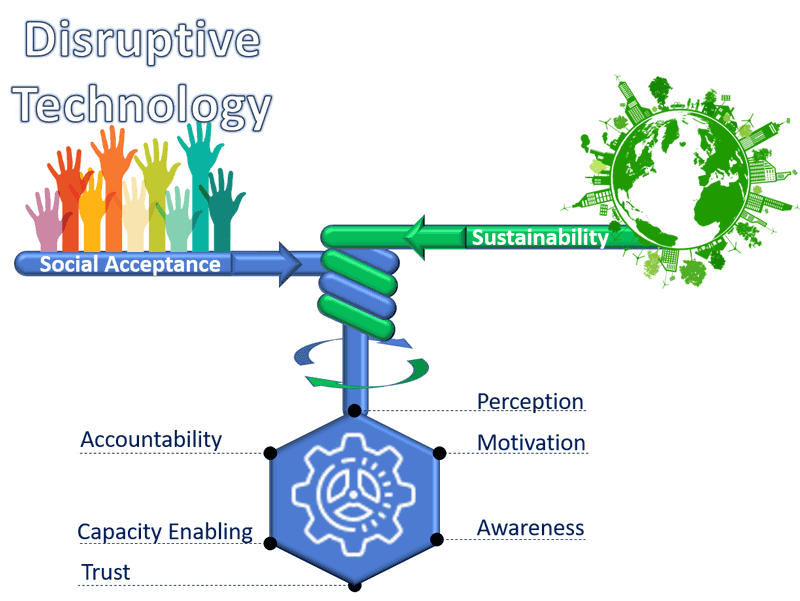by Emanuela Tangari, Carmela Occhipinti and Luigi Briguglio (CyberEthics Lab.)
The CyberEthics Lab. is developing a model to assess the social acceptance of disruptive technologies, and specifically 5G, with the goal of enabling and accelerating innovation and sustainability.
Sustainability, and our concomitant responsibility to future generations, is increasingly becoming a social priority—particularly in developed countries. The UN [1] anticipates that the world’s population will reach 8.5 billion by 2030, with the number of people living within cities rising to 5 billion. In Europe, cities account for 75% of the population, consuming 80% of the EU’s energy. In such a scenario, 5G technology promises to (i) overcome the limits of current infrastructures, designed decades ago for a smaller number of urban dwellers; (ii) spread the connectivity pervasively; (iii) enable capacities, due to reduced latency and enhanced efficiency and bandwidth, for efficiently enacting activities in different domains (e.g. industry, ports, mobility) never considered in the past; and (iv) fostering innovation and sustainability of new and smarter cities for the next decades.
The day-to-day behaviour of humans helps shape society, creating new visions and hopes for the future but simultaneously contributing to mounting economic, environmental, social and security challenges. There is a growing need for innovative technological solutions to help society achieve a sustainable future. In our hyper-technologized societies, as people’s hopes and concerns increase, the need for immediate solutions increases too. Clearly, “we can’t solve problems by using the same kind of thinking we used when we created them”. But the “new kind of thinking”, manifesting as disruptive technology that significantly alters the way that citizens, industries or businesses operate, requires social acceptance. We need a novel way of aligning the thus-far divergent concepts of sustainability, social acceptability and technological innovation. Our approach seeks to combine these three concepts.
In the 1980s, public policy began to enshrine sustainability as a goal in its own right, encompassing ecological reflection and our moral obligation to future generations. Sustainability focuses on meeting the needs of the present without compromising the ability of future generations to meet their needs. Social acceptance (with respect to technology), on the other hand, is concerned with the present (e.g. UTAUT [2]). Finally, technological innovation moves on a seemingly inexorable timeline, continuously evolving. We are therefore faced with three different timelines: that of future human generations; the present, with our current needs and the demand for immediate solutions; and spanning and encompassing both of these, the “flat” timescale of technological innovation.
Our approach has the theoretical objective of extending social acceptance for concepts beyond the immediate needs of the present and, at the same time, bringing concern for future generations into the current psyche. We use a hexagonal diagram to assess the social acceptability of disruptive technologies. From a figurative point of view (see Figure 1), the goal is to make a twist of time on itself, giving back to the flat sense of technological time the ethical and moral reflexivity of human timing, where the concerns and expectations of people who live today approach the concerns of future generations [3].

Figure 1: “Twists of time” throughout the Close-the-Loop model.
Our concept, known as the Close-the-Loop model, aims to observe, understand and evaluate how social acceptance drives the market of 5G technology. It forms part of the European research project “5G-SOLUTIONS” [L1]. This model includes the six fundamental dimensions over which social acceptability (i.e. perception, motivation, trust, awareness, capacity enabling and accountability) are measured and assessed. The method of evaluating technological acceptability is innovative due to its stepwise nature, which is as follows:
1. perception works on a subject’s conscious and subconscious mental patterns;
2. motivation illustrates the moral basis according to which subjects align their preferences;
3. trust represents the level of reciprocity of individual and social expectations;
4. awareness shows the ability for individuals to choose and judge using universal values;
5. capacity for action pinpoints to what extent a technology enables people to all of the above;
6. accountability refers to the degree to which a society and its institutions are able to introduce policies that favour such complex models of acceptance.
This model, including dimensions that are considered in different classical theories of the societal acceptance (i.e. social acceptance, market acceptance and ethical acceptability), is able to (i) “close-the-loop” between the main critical concerns for citizens, justice and policy-makers, and consequently (ii) better track societal feedback. This allows to define and evaluate ethics-driven approaches (based on a better understanding of the technology and willingness to use it) aiming at reducing the barriers of diffidence and mystification against 5G technology, and fostering its wider and faster deployment.
This model and approach are agnostic with respect to a specific technology and application domain and could be applied to a wider set of contexts and case studies.
This document is part of a project that has received funding from the European Union’s Horizon 2020 research and innovation programme under Grant Agreement No. 856691.
Links:
[L1] https://www.5gsolutionsproject.eu/
[L2] https://www.cyberethicslab.com
References:
[1] United Nations, “World Population Prospect 2019: Highlights” (2019) https://kwz.me/h4m
[2] Venkatesh, et al.: “User Acceptance of Information Technology: Toward a Unified View”, (2003) In MIS Quarterly. 27 (3): 425–478. JSTOR 30036540. https://www.jstor.org/stable/30036540
[3] A. Carnevale: “Tecno-vulnerabili. Per un’etica della sostenibilità tecnologica”, (2017) Orthotes Ed., ISBN 978-8893141130
Please contact:
Luigi Briguglio
Cyber Ethics Lab., Italy
http://www.cyberethicslab.com











